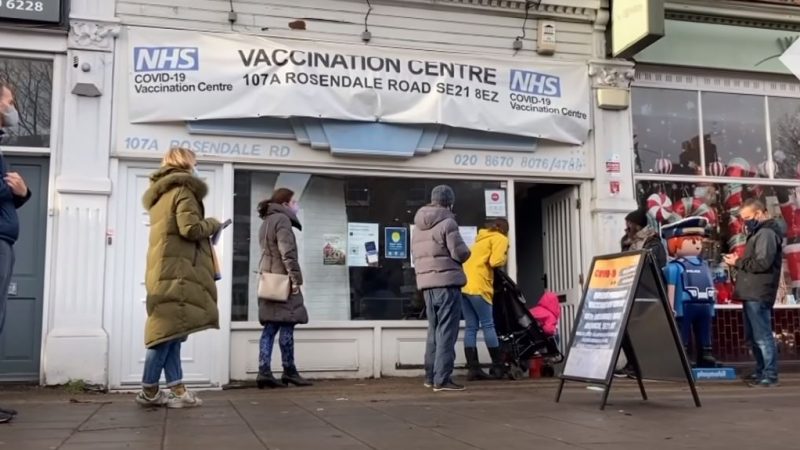The head of the Covid vaccination programme has issued caution about reorienting the NHS to vaccination every three to six months.

This weekend has seen the NHS kick-off vaccinations in football stadiums, shopping centres and Christmas markets, as staff seek to protect as many people as possible from the new highly transmissible Omicron strain.
In a briefing to healthcare staff last week, Emily Lawson, who heads up the vaccination rollout, cautioned of the pitfalls of the NHS being used for vaccination.
“I have fed back to the Department of Health yesterday that I think realistically we don’t have the capacity to do anything else new in the next two-and-a-half weeks.
“And that when we plan for things and have the right lead-up to them, we deliver them more effectively, which in the end is very critical for public confidence,” said Lawson.
Johnson brings “get boosted now” target forward
The vaccination chief’s comments were made after the Prime Minister said anyone aged 18 and over in England will have the chance to get their booster vaccine before the end of the year.
Johnson’s original target was for every adult to be boosted before the end of January, but this was brought forward a month due to rapidly escalating omicron variant cases.
In response to the Prime Minister “get boosted now” announcement made on December 12, NHS England sent a letter to GPs, healthcare providers and hospital chiefs, stating the number one priority for primary care will be delivering vaccines.
Recipients of the letter were also told they could cut out non-urgent care as a means of boosting the vaccine drive. Details on what constitutes as non-urgent treatment were not confirmed.
During a briefing with NHS staff on December 15, Lawson had told employees the NHS is planning for different jab programme scenarios over the next few years, including that “top-up” jabs may be required as new variants surface.
“What’s really clear is we cannot continue to just reorient the NHS to vaccination every three to six months,” Lawson had told NHS staff, information that was shared with The Independent.
During the same briefing, Amanda Pritchard, chief executive of NHS England, said that prioritising vaccination and discharging was the “right thing to do.”
Though Pritchard admitted it was “hard to make some of those judgements on what routine aspects of care might need to be rescheduled … to make space to create the staffing capacity to support those things.”
‘Massive resources’ will be required to deliver booster targets
The NHS chiefs are not alone in heeding warnings about the pressure the government’s booster targets has put on the health service.
Two leading officials from surgeries in the North East have hit out at the measures, saying “massive resources” will be required to deliver the targets.
Dr George Rae, regional council chair of the BMA and GP at a practice in Whitley Bay, and Sheinaz Stansfield, manager of a GP surgery in Gateshead, say they were given “absolutely no notice” of Johnson’s announcement on December 12 that a million booster vaccines are to be delivered a day.
“We just have to wait and see what’s coming. It was going to be a considerable effort anyway for the end of January – but this is really a massive ask.
“We’ll need massive resources if we are even going to get remotely near that. Who will be doing that from primary care?” asked Dr Rae.
“That’ll be doctors giving time, nurses giving time, they’ll need retired doctors and the armed forces to do that. It’s going to be an unbelievable ask.
“And as far as primary care is concerned, if doctors are doing that, then something else is going to have to go,” he continued.
Infrastructure not in place
Stansfield shares similar concerns, saying she was worried the infrastructure necessary to expand the booster programme was not in place.
“They are being very ambitious with these targets. They haven’t thought through the infrastructure. If they want to deliver a million vaccines a day we will need more infrastructure to do that – and that’s not in place.”
“It was very unkind to make an announcement like that at that time on a Sunday night when we had no time to plan or prepare for it. As a result, our phone lines were absolutely inundated. Given the pressure we are already under, I thought that was incredibly unfair at a time where we need compassion,” Stansfield added.
Pointing to the huge pressures the NHS is already under, Chris Hopson, chief executive of NHS Providers, the membership organisation for all of England’s 215 ambulance, community, hospital and mental health trusts, says if the NHS falls short on booster targets, it won’t be for want of trying.
Gabrielle Pickard-Whitehead is a contributing editor to Left Foot Forward.
Left Foot Forward doesn't have the backing of big business or billionaires. We rely on the kind and generous support of ordinary people like you.
You can support hard-hitting journalism that holds the right to account, provides a forum for debate among progressives, and covers the stories the rest of the media ignore. Donate today.



